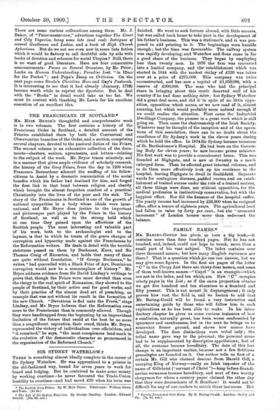SIR SYDNEY W.A.TERLOW.a THERE is something almost ideally complete in
the career of Sir Sydney Waterlow. He was apprenticed to a printer in the old-fashioned way, bound for seven years to work for board and lodging. But he contrived to make some money by working overtime—he never favoured the Trade-Union hostility to overtime—and had saved 230 when his term was
• The Scottish Grey Priors. By W. Itioir Bryce. Edinburgh : William Green and Sons. [L2 2s.] t The Life of Sir Sydney Waterloo. By George Smalley. London : Edward Arnold. 110a. Bd. net.'] finished. He went to seek fortune abroad, with little success, but was called back home to take'part in the development of his father's business. This was a atationer's; and it was pro- posed to add printing to it. The 'beginnings were humble enough ; but the time was favourable. The railWay system was rapidly developing, and Waterlow and Sons came in for a good share of the business. They began by employing less than twenty men. In 1876. the firm • was converted into a limited company, and the establishment which was started in 1844 with the modest outlay of £120 was taken over at a price of £275,000. This company was twice reconstructed, and has now a eapital of £1,350;000, with a reserve of 2300,000. The man- who had the principal share in bringing about this 'teat deserted well of his country if he had done nothing nrrtire ; but Sydney Waterlow did a great deal more, and did it "in spite of no little oppo- sition, opposition which seems, as we now read of it, almost amazing, but which would probably seem natural enough if we could realise the situation. • First came the Industrial Dwellings Company, the pioneer in a great work which is still going on. Then came the chairmanship of the Irish 'Society. Whatever may be thought of the inception and of tbe opera- tions of this association, there can be no doubt about the excellence of Sir Sydney's work in the eleven years. during which he held the office. In 1874 Sir Sydney became treasurer of St. Bartholomew's Hospital, Jla had been on the Govern- ing Body for eleven years; he now became prime minister. His first work was to provide a convalescent home. This was founded at Highgate, and is atm t Swanley in a much enlarged form. Then he effected,great internal reforms, and to do them more- effectively took .up his residence. in the hospital, leaving Highgate to dwell, in Smithfield. Separate wards for contagious diseases,a3a1ded rooms 1 land an estab- lishment of trained nurses under the rule of a. trained matron, all these things were done, not without opposition, for the medical profession is instinctively conservative,• but with the happiest effect. Nor did the finances of the hospital suffer.
The yearly income had increased by. ,000 when he resigned office, after a tenure of eighteen years. The agricultural land had fallen in value by forty percent., but the "unearned increment" of London houses -.more than redressed the
balance. .










































 Previous page
Previous page